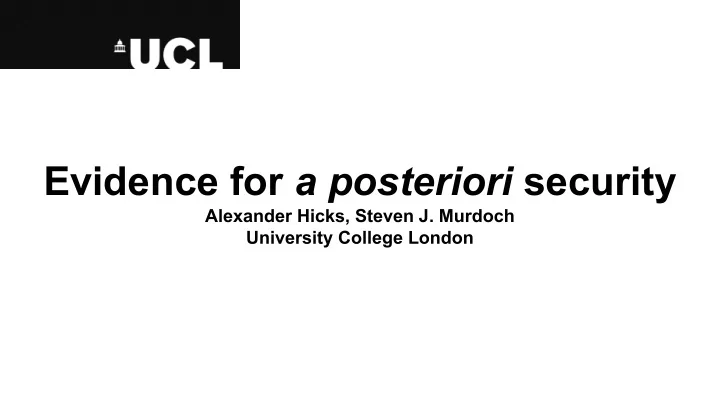

Evidence for a posteriori security Alexander Hicks, Steven J. Murdoch University College London
Evidence? Liability Accountability Law Due process Auditability Verifiability Integrity Proof Non-repudiation P(A|E)>P(A)
Some background ● Ideal security goal: build secure systems that won’t fail in any way, control information flow in systems ● Realistically, systems have many points of failure: ○ Protocol & human failures ○ Flawed rules ● Behaviour of the system cannot always be restricted to fit security goals Protocol Party Rules
Some background ● Murphy’s law/First axiom of infosec: anything that can go wrong will go wrong ● Impact of a failure varies from party to party ○ “Fail safe”: party not responsible for a failure should not bear the costs ○ “Fail deadly”: party responsible for a failure should bear the costs ● Accountability adds an incentive to avoid failures, but it requires an enforcing mechanism: evidence
Some background ● Assume you have to deal with parties that can do anything e.g., law enforcement, kids ● Assume a trusted third party or a consensus mechanism that can make a decision and enforce it, it requires something to make the decision ● For our purpose, evidence is anything that can be used to make that decision i.e., assign liability ● Rather than help avoid failures, it helps deal with them after the fact ○ Security: identify the issue that caused a failure ○ Privacy: identify a privacy violation (typically policy)
Some examples ● Payment systems ○ Security Protocols and Evidence: Where Many Payment Systems Fail (Murdoch & Anderson, FC 2014) ● Access to data ○ VAMS: Verifiable Auditing of Access to Confidential Data (2018) ○ Ian Levy (NCSC Technical Director),on the privacy debate of data interception and surveillance: “My call is for more transparency, more openness and more evidence in this debate” (https://youtu.be/LRiAcbvSA3A?t=1h11m46s) ● Cryptocurrencies ● Many more, pick one related to your interests
Questions ● What’s the correct model for the use of evidence? ● How should evidence be produced? ● What form should evidence take?
Threat model ● Threat modelling: want to account for parties that have “freedom” ● Compare to the “honest” ideal of what the party is doing, as specified by the system rules ● Deviation is realistic, but evidence allows evaluating the deviation and deciding if something was done wrong ● Goal: If someone deviates, there should be evidence so that they can be held accountable
Models ● Games are a standard way of modelling problems ○ Ideally: equilibrium that restricts deviations by ensuring detection ● Our setting has a few special attributes that aren’t usually discussed: ○ Strategies have costs ■ What’s the cost of deviating against the cost of auditing? ○ If the system is open, all players aren’t necessarily known ■ Distribution over player types and computational capabilities? ○ Evidence adds new information to the system as it evolves ● Possible approach: Bayesian machine games (Halpern and Pass) ○ Bayesian game (incomplete information) ○ Takes into account machine types and a complexity function
Evidence principles ● System independence: a system failure should not lead to failure of evidence production ● Reliability: Evidence should contain all information required to make a decision, but no more ○ Requires a clear definition of decision mechanism ○ Not possible to make liable an innocent party, no deniability for a guilty party ● Robustness: Evidence should be tamper-resistant ● Retention: Evidence collection and retention should not depend on a single party
Evidence production ● Logging actions ○ Merkle trees (Blockchains, Trillian) ○ Tamper-evident way of keeping records of actions ○ Is there a way of enforcing automatic logging of actions? ● Verifying computations ○ Existing cryptographic tools for verifying execution of programs ○ Generalising to things that aren’t programs? ● Proofs-of-X ○ Task specific proofs only ● Systems aspects: embedding the evidence production on top of a system
Presenting evidence ● Three settings for presentability ● Production level ○ Presented internally, no need for public presentability ● Expert witness: ○ Presented publicly to an expert witness, limited need for presentability but need for explainability ● Non-expert: ○ Presented to the public, convincing levels of presentability and explainability needed
Forms of evidence ● Many trade-offs that have to be considered in context ○ Presentability ○ Verifiability ○ Privacy ● Evidence design should happen alongside system design
Questions ● What’s the correct model for the use of evidence? ○ Unknown, varying participants ○ Computational costs ○ Evolving system ● How should evidence be produced? ○ Cryptographic evidence ○ Non-cryptographic evidence ● What form should evidence take? ○ Presentability ○ Privacy ○ Verifiability
Conclusion Questions? alexander.hicks@ucl.ac.uk alexanderlhicks
Recommend
More recommend